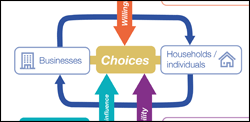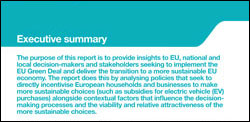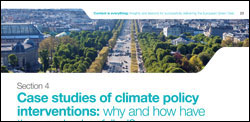10 October 2022 - This CLG Europe report analyses policies that seek to directly incentivise European households and businesses to make more sustainable choices alongside contextual factors that influence the decision-making processes and the viability and relative attractiveness of the more sustainable choices. In doing so, it provides insights to EU, national and local decision-makers and stakeholders seeking to implement the EU Green Deal and deliver the transition to a more sustainable EU economy.
This is a crucial moment for the EU to develop and implement the policies and plans needed to address the multiple crises we face. This is also an important moment for political negotiations on the Green Deal, as EU decision-makers are finalising the Fit for 55 Package aimed at achieving the EU’s enhanced 2030 targets, while also working to deliver the REPowerEU plan. At the same time, national authorities must update their National Energy and Climate Plans (NECPs), which set out how they will deliver the policies needed to implement these ambitious EU targets.
In this report, we draw on the existing literature and a set of policy and business case studies to show how different contextual factors interplay with each other and climate policy measures, thus affecting their outcomes. This report shows that a strong, ambitious and coherent climate policy framework must go hand in hand with the creation of enabling conditions that encourage households and businesses to make more sustainable choices.
The report focuses specifically on practices, behaviours and choices linked to:
- buildings including heating, cooling, water heating, lighting and energy efficiency)
- energy (including on-site renewables deployment and the shift away from fossil fuels)
- transport (including mobility choices and EV uptake)
- circular practices (such as packaging of household consumables, recycling, and waste)
The analysis and case studies can help national and local policymakers to better understand how, by taking into consideration the prevalent contextual factors and seeking to change them where necessary, they can design and implement policies to deliver positive climate outcomes while also improving public acceptability.
Citing this report
Please refer to this publication as: University of Cambridge Institute for Sustainability Leadership (CISL). (2022). Context is everything: Insights and lessons for successfully delivering the European Green Deal. Cambridge, UK: CLG Europe.
Explore the report
How are CLG companies taking action?
“Successfully delivering the European Green Deal requires a coherent approach on all elements of the energy transition, from tapping into energy savings to investing in clean energy. Yet as some areas will have a longer-term horizon, it is crucial for Europe to significantly step up our efforts on energy efficiency which will lend many benefits in the short term, including reducing carbon emissions, creating good local jobs and reducing energy bills. With half of Europe’s light-points still being old technology, a switch to LED lighting will save Europe close to Euro 56 billion. Having enabling policies that drive adoption of carbon-friendly technologies will not only accelerate the energy transition, but also spur the innovations that Europe can lead on.”
Harry Verhaar, Head of Global Public & Government Affairs, Signify
"The current multicrisis context demonstrates the need to accelerate the energy transition to increase strategic autonomy and decarbonize the economy. Iberdrola is leading by example by investing a further €150 billion in the energy transition in this decade, building on a €120 billion investment over the last two decades. However, stable regulatory frameworks and the right market signals will be required to attract and retain the vast amount of capital needed for this process."
Gonzalo Sáenz de Miera, Global Director of Climate Change and Alliances, Iberdrola
“We are taking action to support a circular economy for our packaging and offer consumers a range of sustainable options. This will help to ensure an efficient use of resources and reduce greenhouse gas emissions in line with the aims of the European Green Deal. However, progress depends on coherent policy action to support the cornerstones of circularity - high collection rates via well-design deposit return schemes, high levels of recycled PET and priority access to post-consumer beverage packaging to support bottle to bottle recycling and prevent the downcycling of valuable resources.”
Joe Franses, VP of Sustainability, Coca-Cola Europacific Partners
“ACCIONA is committed to accelerate urban regeneration in all its Real Estate projects. Aligned with EU Taxonomy, we have incorporated solutions into our buildings that contribute to protect and regenerate the environment, while reducing costs for owners.
Companies should count with a common strategy to overcome the barriers between economic growth based on fossil fuels and a decarbonized economy. As we move into an increasingly unstable world, we need to establish a foundation that allows us to grow while facing the ever more rapidly occurring crises in a sustainable way.”
Andrés Pan de Soraluce, ACCIONA Real Estate CEO
Read the business case studies here.









